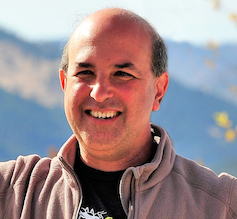An article on math teaching by mathematician and teacher Paul Lockhart has gone viral on the net and reached me recently. In his “Mathematician’s Lament”, Lockhart compares real mathematics to an art such as music or painting. He then argues for a very “constructivist” way of teaching mathematics, meaning letting kids figure out math for themselves, with hints from the teacher, rather than dictating to them a series of steps to learn. You would not teach music by making kids learn how to write musical notation, nor painting through memorizing colors, but Lockhart argues that mathematics instruction is taught in just such a rote, boring way. He makes interesting points along the way such as how much of school math is irrelevant to most students once they finish taking their standardized tests. Who really uses trigonometry? (Actually, I’ve used it a lot, but he makes an exception for scientists and engineers). The whole essay drives home one reason why the current way of teaching math creates math phobia in many students and math boredom in many more, despite mathematics being a very elegant, artistic endeavor.
The essay is a heartfelt contribution to the debate over how to teach. At SimBiotic, we certainly lean towards the play/constructivist side of this debate with our inquiry-based philosophy in writing labs, although we find in practice we have to structure the labs more than a teacher such as Lockhart would like. But the essay also set me thinking in a different direction, about who is best positioned to improve teaching on a larger scale.
Experts in a subject do not always make the best teachers. Someone for whom a skill comes easily, or has been ingrained through years of practice, may have a lot of trouble understanding the stumbling points for a novice just learning the skill. That’s not always true, of course. There are remarkable scientists who are also remarkable science teachers. But my experience is that there is no strong correlation between science research skills and science teaching skills. I wonder if the same could be true for teaching itself? Lockhart is obviously a gifted teacher. Can Lockhart imagine what it’s like to be a math teacher without his gifts. Would the techniques that Lockhart advocates work in the hands of someone less totally excited about mathematics? And if the answer is no, what is the most useful contribution that inspired teachers like Lockhart can make towards a broader reform of curriculum?
I don’t have an exact answer to this. Gifted teachers tend to have really interesting ideas for instructional materials and approaches, as we’ve found from the many great instructors we interact with. But on their own, I suspect most of these gifted teachers could not take their ideas, which work nicely in their own classes, and transform them into something that works well in many classrooms. That’s not just because of technical barriers. At SimBiotic we have learned a toolbox of techniques that we intuitively know will make things work for many students at many schools. We find that when we bring new people on board, that intuition and toolbox takes a long time to learn. How is this related to teaching skill, training in education, scientific research, or any of the other backgrounds that we bring to our work? I don’t know, but I suspect teaching how to teach and developing teaching tools are both somewhat separate skills from being a good teacher.




